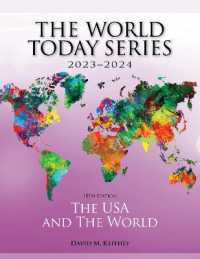- ホーム
- > 洋書
- > 英文書
- > Politics / International Relations
Full Description
This book features a comparative study in intelligence accountability and governance across the Five Eyes: the imperative for member countries of the world's most powerful intelligence alliance to reconcile democracy and security through transparent standards, guidelines, legal frameworks, executive directives, and international law. It argues that intelligence accountability is best understood not as an end in itself but as a means that is integral democratic governance. On the one hand, to assure the executive of government and the public that the activities of intelligence agencies are lawful and, if not, to identify breaches in compliance. On the other hand, to raise awareness of and appreciation for the intelligence function, and whether it is being carried out in the most effective, efficient, and innovative way possible to achieve its objective. The analysis shows how the addition of legislative and judicial components to executive and administrative accountability has been shaping evolving institutions, composition, practices, characteristics, and cultures of intelligence oversight and review in the United States, the United Kingdom, Canada, Australia, and New Zealand using a most-similar systems design. Democracies are engaged in an asymmetric struggle against unprincipled adversaries. Technological change is enabling unprecedented social and political disruption. These threat vectors have significantly affected, altered, and expanded the role, powers and capabilities of intelligence organizations. Accountability aims to reassure sceptics that intelligence and security practices are indeed aligned with the rules and values that democracies claim to defend.
Contents
1: Introduction: The Democratic-Intelligence Paradox
2: Comparing Intelligence Accountability: Analytical Framework, Theories and Trends
3: United States of America
4: United Kingdom
5: Canada
6: Australia
7: New Zealand
8: Varieties of Intelligence Accountability: The Institutional Foundations of Comparative Democratic Advantage
9: Foundations of Intelligence Accountability in Democratic Regimes








